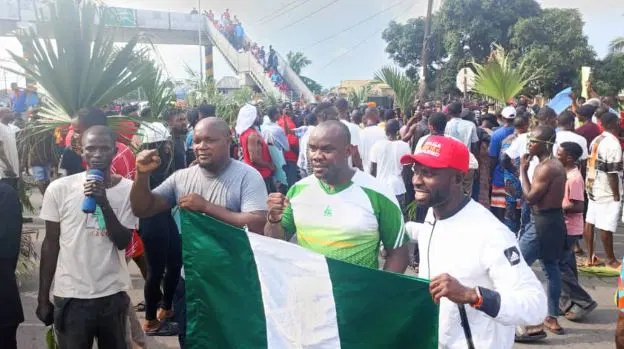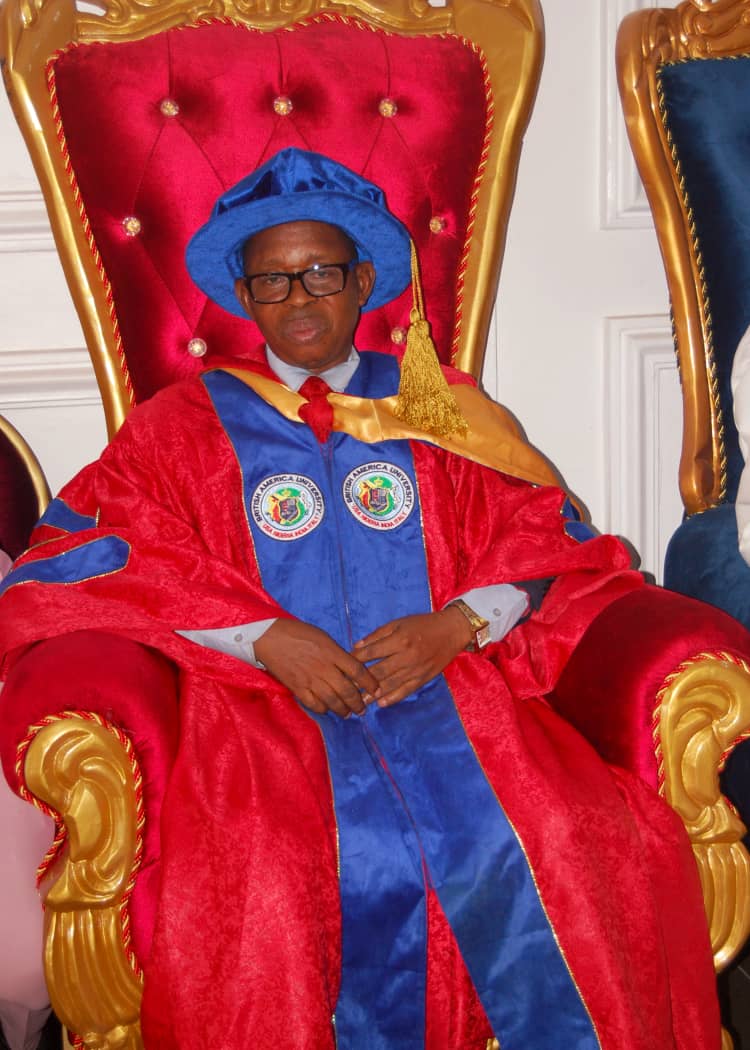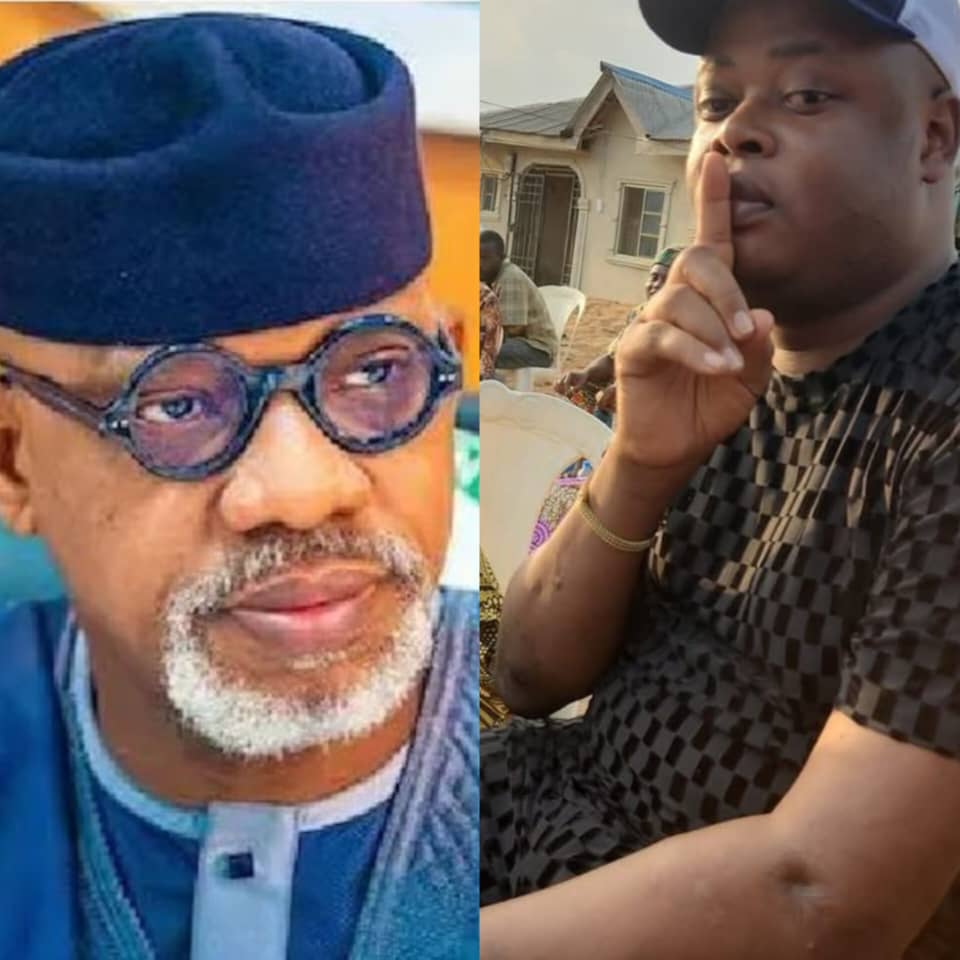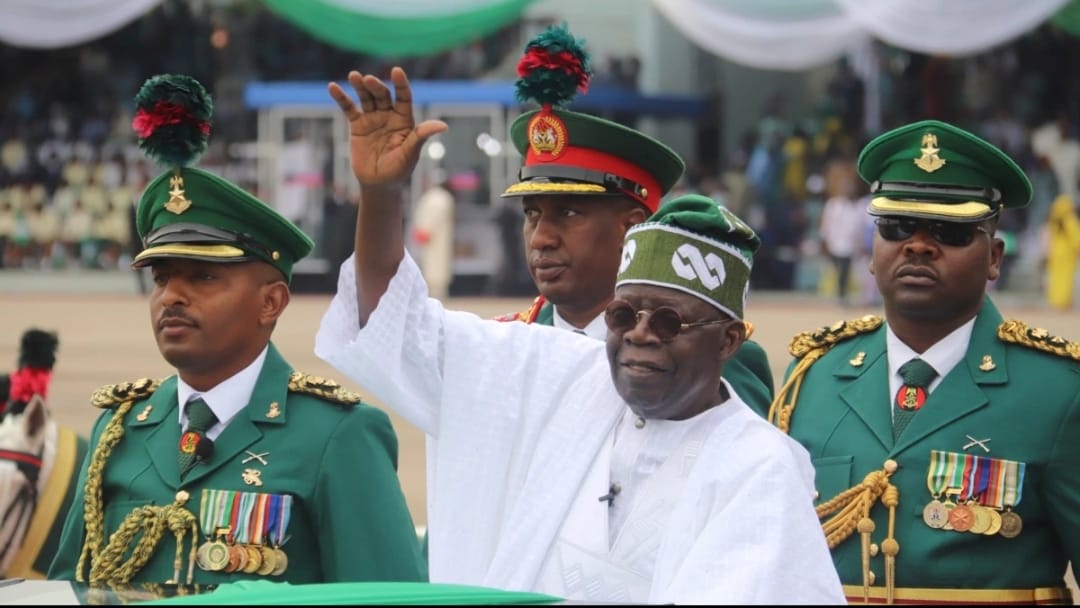society
Hardship: Igbo Elders Reveal Why Igbo shunned nationwide protest
Published
8 months agoon

Hardship: Igbo Elders Reveal Why Igbo shunned nationwide protest
It is no longer news that Igbo, especially in the five Southeast states, did not participate in the End Bad Governance protest that started in other parts of the country on August 1.
However, why the Igbo shunned the protest and the implications for the country are raising issues in the polity.
Across other parts of the country, angry protesters stormed the streets and for more than five days vented their spleen against what they described as bad Governance, hunger and hardship in the country. The protest became riotous in the North as hoodlums looted shops, and business centres among others. Many states declared curfews to contain the mayhem.
But there was pin-drop silence in the South-East leading many to ask if the zone and Igbo are insulated from the prevailing economic downturn in the country.
Ameh fingers inequity, injustice
Speaking on the issue, Chief Peter Ameh, former Presidential candidate and national secretary of the Coalition of United Political Parties, CUPP, said the “absence of equity, justice and fairness is the reason for the political apathy by Igbo in the Nigerian project.”
According to him, “constant and unjust scapegoating of the Igbo ethnic group in Nigeria is the major reason why Igbo abstained from the nationwide protests.”
He continued: “Failure to implement General Yakubu Gowon’s Reconstruction, Reconciliation and Rehabilitation programme is a catalyst for growing lack of commitment by all persons of Igbo extraction within and outside Nigeria in many programmes of the government.”
Chief Ameh also attributed Igbo boycott of the protest to “marginalisation of Igbo in strategic economic and administrative positions under the APC governments, and acts of tribal exclusion mixed with political bigotry.”
He continued: “The main reason why the entire Southeast geopolitical zone of Nigeria was unanimous in their decision not to participate in the ongoing #EndBadGovernanceInNigeria protest across the country is primarily as a result of the easy targeting of lives and property of Igbo whenever there is an uprising or protests in Nigeria.
“Being the only tribe in Nigeria that could be found and visibly seen in the remotest parts of the country, Igbo are always at the receiving end of the consequences of any activity carried out either by the Nigerian government or the public.
A typical example is seen in the 2023 general elections where the Igbo were violently attacked and threatened because they decided to vote for a particular candidate of their choice.
“I may be inclined to justify the decision of Ndigbo to distance themselves from the ongoing protest based on the way and manner they are being treated in Nigeria regarding their engagements in the affairs of the Nation especially under the APC governments.
“Just like other marginalised ethnic nationalities in Nigeria, Igbo remain an integral part and the economic backbone of the Nigerian Nation. The earlier they are fully accepted and given a sense of belonging in the affairs of this Nation, the better and more productive the country will become.
Implications of the boycott
“The entire South-East boycotting protests can have long-term implications and consequences. Boycotting protests can marginalize the voices of those who are already vulnerable or excluded, making it harder for them to be heard and potential for further division between South easterners and their regional allies in Nigeria.
“Boycotting protests can create divisions within them and other regions of the country, potentially leading to further conflict and distrust between them and other ethnic communities of the Nation.
“The region may be further marginalized if they are not actively participating in such national protests, potentially leading to increased exclusion from decision-making processes.
“By ? boycotting the End Bad Governance protests in Nigeria, they may have missed the opportunity to build alliances and negotiate with other sub-national regions that could bring about meaningful future collaboration.
“The boycott may be perceived as a lack of commitment to the plight of others and may be viewed as an act of insensitivity toward others which may further widen the trust deficit in the country.”
Why our people shunned protest —Igbo Elders
Some Igbo Elders shared Chief Ameh’s thoughts.
According to Prof. Obasi Igwe, the Director, Media and Publicity, at the United Igbo Elders Council, UNIEC, Worldwide, the Igbo declared a lack of interest in the protests not because they didn’t know there was bad governance but because the same souls were badly governed have never condemned the isolation of mostly Igbo, and some Middle Belters and Hausa, for slaughter and annihilation.
The Igbo shunned the #EndBadGovernance nationwide protest based essentially on the differential attitude to human rights that the organizers have shown towards the Igbo/East in particular, and other Nigerians as well.
“The Igbo also feel, with experience, that the people who are angry that they did not participate in the protest may turn round halfway to claim it was the Igbo that caused the bad governance protests, with the usual consequences on the Igbo people.
“Easterners, in general, must establish the seriousness of anything before deciding on it, because they desire the salvation of everybody on a common civilizational principle, not ad hoc coalitions to forge ahead against one side today and another tomorrow, ending up with no substantive beneficial change.”
Prof. Igwe also stated that Igbo were suspicious of the whole arrangement of the protest, saying: “You are protesting against your oppressors, and you have time to negotiate with the same oppressors on how you talk, where to talk, how, where and when to assemble, and other such pretences as discussing how to present your case to a starving and dying populace with the same people responsible for your ordeals! And, you will be presenting your case, the “protests,” in concealed corners where you would only be talking to yourselves while “life” or “bad governance” goes on outside the walls, and, you are protesting!”
Added to that according to Prof. Igwe, is “You start looting the shops and markets of those you wish to join you. That was why the Igbo refused to participate, without this being any form of acquiescence to bad governance, of which, by the way, the Igbo have all along been the worst targets in Nigeria.”
He also said Ndigbo did not only shun the protest but they equally opened their markets and demanded unconditional release and rehabilitation of Mazi Nnamdi Kanu, and others.
“Also, the Igbo shunned the #EndBadGovernance nationwide protest because of the loud silence, signalling acquiescence, of some of its organizers to the extremely targeted injustices against the Igbo/East and, for the last nine years, orchestrated killings, with countless evidence of official involvement or connivance, with no sympathy from anywhere.
“Right now, even before the August 1 date the protest started, the Ndigbo were already being threatened, attacked and molested in Lagos with no word of condemnation by those said to be fighting against bad governance.
“Nevertheless, the Igbo population, being the major victims, understand the Nigerian situation very well, and know what can be done to address it, starting with ending the unparalleled oppression of Easterners.”
Related
Sahara weekly online is published by First Sahara weekly international. contact saharaweekly@yahoo.com


My plans for my people…. Professor Muhammad
Omolaja Professor Muhammad Omolaja is the president of the Yoruba Elders Union (YEU) which covers the entire Yoruba race in Nigeria and abroad. He is also a prominent member of the Yoruba Council of Elders (YCE) which is another socio-cultural association of Yoruba Leaders. Professor Omolaja’s socio-cultural engagements go beyond the Yoruba Land as his network cuts across the entire north and south of Nigeria and beyond. For instance, he is the Ike Mba 1 of Africa and one of the National Patrons of the Nzuka Nd’Imo Organisation (NNIO) worldwide among other connections.The professor in this exclusive interview explained in details his mission and vision for his constituency and beyond if he gets the nod under the platform of the Social Democratic party (SDP) as a prominent member of the Party.
Excerpts:
Humbly introduce yourself, Sir.
I am Prof. Muhammad Ayinla Omolaja (MAO) – The Ike Mba 1 of Africa – from the Obe Royal family of Emado Quarters, Ayetoro City, Yewa North Local Government Area of Ogun State.
What’s that position you are virying for and under what party?
Actually, this question is immature as (a) INEC has not issued out guidelines on the 2027 general election, and (b) I have been aspiring and contesting consistently for various positions under various Parties from 2007 up to date. I came out for positions including Federal House of Representatives (under the PDP), Senate (under the ANPP and DPA), Governorship (under the APC), up to the Presidency (under the ADP) in 2023 general election. This means that definitely, I will come out again in 2027 by the special grace of the Almighty God. However, I am still consulting. The decision as to which position I will contest for will be a joint one with my political colleagues and associates when the time comes. I am presently a strong member of the Social Democratic Party (SDP), which means I will be contesting under the platform of the great Party.
Are you coming under consensus or you are solely voted for?
For now, there is no information on this.What are your chances going by the fact that it’s APC that is ruling?
Definitely, Nigerians, including me, have suffered more than enough hardship of various magnitudes under the APC and PDP administrations over the years! We are now wiser! What we need now is a complete change of guards in the political arena, and the only Party that can do that as at now is the Social Democratic Party being the only Party that is settled. Other Parties in opposition are presently faced with one crisis or the other ranging from factionalism, court cases, unnecessary rivalry, hatred and jealousy, to mention but a few. Therefore, anybody that will contest for a position under the SDP in 2027 has a very high probability of winning the election.
If eventually you emerged as the party’s candidate, do you see yourself winning the general election?
For a person to win a general election, irrespective of the post, he or she must be someone that is popular and acceptable to the majority of the people within his or her domain; that is, his constituency. This depends on many factors including his upbringing, family background, education background, community participation or contributions to the community, his political activism, leadership quality, and of course, his financial stability to mention but a few. In all these criteria, I think I am up to the task!
What’s your plan for your constituency?
My plan for the great people of my constituency may be summarized as “To let the masses live in all ramifications! This depends on the post I will contest for, but my mission in governance includes adequate food supply, uninterrupted power supply, adequate security of life and property, quality education, youths and women empowerment, good intergovernmental relations, appropriate civil service reforms, fiscal and monetary policies, adequate reforms in the traditional settings, industrialization, as well as taking care of the elderly; the old people in our communities, and so on.
Is there any team you put on ground that make you believe you can win the election?
Yes! There are many. One of them is the National Liberation Patriots (NLP) of which I am the founder and National Chairman. It has membership in all the 36 States of the federation and the Federal Capital Territory. The national political group parades the best quality of politicians that can be found anywhere in the world as members based on their level of political exposure and activism. The second group is the Omolaja Solidarity Forum (OSF). The OSF also spreads to the entire Nigeria covering all the six geopolitical regions of the country. This is followed by the Coalition for Sustenance of Democracy (CSD) which is also a national political association. Again, I am one of the National Patrons of Nzuko Nd’Imo Organisation (NNIO) Worldwide apart from being the Ike Mba 1 of Africa. Finally, I am the President of the Yoruba Elders Union (YEU) which covers the entire Yoruba race in Nigeria and abroad! I am also a prominent member of the Yoruba Council of Elders (YCE). With all these socio-cultural and political associations, and many more, on ground, I believe I can win election into any political office in Nigeria.
What is your message to the people concerning your ambition?
My message to the good people of our great nation is that the job of recovering, restoring and developing our much-cherished damaged country, Nigeria, is a task for all of us individually and collectively irrespective of our tribes or ethnicity, religions or our places of birth. We should forget about our differences in diversity and team up as one indivisible Nigerian family to recall our country back to life through the power of ballot papers during the forthcoming 2027 general election
Related
society
Debegun Family Cries Out To Governor Dapo Abiodun As Notorious Landgrabber Lateef ‘Eleda’ Leads Violent Invasion in Shagamu
Published
3 hours agoon
April 14, 2025
Debegun Family Cries Out To Governor Dapo Abiodun As Notorious Landgrabber Lateef ‘Eleda’ Leads Violent Invasion in Shagamu
The Debegun family of Shagamu, Ogun State, is appealing to the highest authorities in Nigeria to intervene in a troubling situation that has left their community shaken and distressed. On April 12, 2025, the family was once again subjected to a violent invasion on their land by suspected ajagungbale—a local term for land grabbers who often use force and intimidation to seize land.
According to the family, this isn’t the first time they’re experiencing such terror. In what appears to be a coordinated attack, armed men reportedly stormed their town, shot at residents, and with the backing of some members of the police, whisked away community members to Abeokuta—placing them in the hands of the state’s land task force, allegedly led by one Mustapha Akeem.
The family’s plea is now directed to the Inspector General of Police, the Ogun State Commissioner of Police, Governor Dapo Abiodun, and the Attorney General of Ogun State, urging them to investigate and put a stop to what they describe as “systematic harassment” by these land-grabbing syndicates.
What makes this situation even more alarming is the eerie similarity to a previous incident last year. Members of the community were taken by force from an event, charged to court the next day without a chance to explain themselves, and ended up spending six months in custody before they could secure legal representation. The Debegun family fears a repeat of this injustice is already underway.
“This has become their mode of operation,” a family representative said. “Those picked up yesterday are already being prepped for court. No proper investigation, no fair hearing—just like last year. Meanwhile, some of our people who were shot during the attack are currently treating themselves with their own money. Where is the justice in that?”
The alleged ringleader of the invading group is one Ganiu Lateef, popularly known as Eleda—a man described as notorious and feared across Ikorodu and Shagamu. Others named in the group include Sunday Williams, Amisu Akinlawon, Sukanmi Kadiri, Abiodun Odunsi, and Seyi Fakoya (a.k.a. Were), with additional names still being verified.
The family says they are not just fighting for their land, but for their dignity and safety. “It’s now becoming difficult to understand the role of the police in all this,” the spokesperson continued. “Are they here to protect us, or to help these thugs strip us of our rights? We are calling for thorough investigations, accountability, and protection.”
This is a cry for help from citizens who feel abandoned in their own homeland at Konigbagbe Bus/stop, Shagamu, Ogijo Road. The Debegun family is hoping their voices reach those who have the power to act—before the situation escalates any further.
Related
society
Old Lies, New Excuses: How the Nigerian Government Continues to Insult Public Intelligence”
Published
4 hours agoon
April 14, 2025
“Old Lies, New Excuses: How the Nigerian Government Continues to Insult Public Intelligence”
By George Omagbemi Sylvester
In a stunning yet all-too-familiar display of condescension toward the Nigerian people, the Nigerian Presidency has declared that “nothing new has been revealed” in the decades-old FBI and DEA reports implicating certain high-profile individuals in drug trafficking and money laundering. According to their recent statement, the information “has been public for over 30 years.” While this may be factually true, the real question is: does the age of a crime nullify its relevance or accountability? The answer, in any democracy with a shred of integrity, is a resounding no.
This is not just about dusty files or forgotten scandals. It is about integrity, national image, and the dangerous precedent of shielding political elites from scrutiny while expecting ordinary citizens to abide by the law. When governments trivialize criminal histories under the guise of “old news,” they mock the very foundations of justice and accountability.
1. The Facts: Public but Never Prosecuted
Let us begin with the basics. The U.S. Federal Bureau of Investigation (FBI) and the Drug Enforcement Administration (DEA) released reports in the 1990s implicating several individuals—including now-prominent Nigerian political figures—in drug-related activities. Among these, the most infamous is the case involving Bola Ahmed Tinubu, the current president of Nigeria. According to court documents from the Northern District of Illinois (Case No. 93C4483), U.S. authorities confiscated over $460,000 linked to Tinubu as part of a drug trafficking investigation.
While Tinubu was never formally indicted in the U.S., the forfeiture of such a staggering amount, without any legal contest, is not a minor issue. In the U.S. legal system, civil asset forfeiture—especially of such magnitude—almost always suggests deep suspicion and probable cause. No ordinary citizen could forfeit nearly half a million dollars to the U.S. government without triggering career-ending investigations, but in Nigeria, it earns you the presidency.
2. If It’s “Old News,” Why Is It Still Relevant?
The Presidency’s attempt to dismiss the scandal by calling it “nothing new” is intellectually insulting. Crimes do not expire simply because time has passed. If anything, they become more pressing when perpetrators ascend to greater positions of power. Consider the case of Augusto Pinochet in Chile. His crimes against humanity were decades old by the time he was arrested in London in 1998. Yet, democratic nations supported his prosecution because the rule of law demands that no one is above accountability.
The same logic applies to Nigeria. The relevance of Tinubu’s past is not diminished by the passage of time; it is amplified by his current position. If someone once linked to drug money can become Commander-in-Chief without explanation or legal exoneration, what message does that send to the youth of Nigeria? That crime pays—especially if you’re politically connected?
3. The Global Impact: Nigeria’s Image in Tatters
The world is watching. International investors, diplomats, and foreign governments have access to these same reports. While Nigerian officials downplay the severity, external stakeholders are not fooled. The 2023 Corruption Perceptions Index (CPI) by Transparency International ranked Nigeria 145 out of 180 countries. The World Bank’s Governance Indicators show a steady decline in Nigeria’s control of corruption since 2015. These metrics are not coincidental—they reflect a system that promotes impunity and suppresses transparency.
When the President of a country is associated—even by forfeiture—with narcotics and financial impropriety, global trust in that nation’s governance plummets. Foreign direct investment dries up. Credit ratings drop. Diaspora professionals become hesitant to return. Tourists and scholars think twice before visiting. The long-term economic and diplomatic damage is incalculable.
4. Weaponizing Ignorance: An Assault on Intelligence
Let us not overlook the arrogance embedded in the Presidency’s statement. It assumes the Nigerian public is too ignorant or apathetic to care. It dismisses educated critics, legal scholars, and concerned citizens with the wave of a hand. “Nothing new,” they say, as if moral decay becomes acceptable with time.
But the Nigerian people are not fools. A new generation of politically aware youth, empowered by the internet, is beginning to ask hard questions. Why was this man not investigated locally? Why do we have an EFCC that cannot probe elite politicians but enthusiastically arrests poor youths for internet fraud? Why are pastors, professors, and professionals expected to maintain ethical standards, but politicians are allowed to skate through history with blood on their hands and cocaine in their past?
5. Silence from the Legislature: Complicity in Cowardice
Perhaps even more alarming than the Presidency’s defense is the deafening silence from Nigeria’s National Assembly. The job of any legislature in a democracy is oversight. Yet, our lawmakers have chosen to be quiet spectators, perhaps fearful of implicating their own skeletons in the process.
Contrast this with the United States, where congressional hearings have investigated presidents and vice presidents for far less serious allegations. In South Korea, two former presidents have been imprisoned for corruption. In Brazil, Luiz Inácio Lula da Silva was jailed, released, and had to go through rigorous legal review before being re-elected. But in Nigeria, once you reach a certain echelon, your past is magically erased, sanitized, and glorified.
6. The Judiciary’s Abdication of Duty
The courts have also failed Nigerians. When activist lawyers attempted to bring these issues to court during the 2023 election, the Nigerian judiciary found clever procedural ways to sidestep the real questions. Technicalities were prioritized over substance. Evidence was deemed “inadmissible.” And so, justice was not denied, it was simply postponed indefinitely.
A nation where the courts fear the political elite is a nation on the brink of democratic collapse. The judiciary must regain its spine and remember that its allegiance is to the Constitution, not the cabals who occupy Aso Rock.
7. Public Reaction: Indifference or Boiling Rage?
It is true that many Nigerians have grown numb to scandal. From fuel subsidy fraud to missing billions in defense budgets, corruption fatigue is real. But apathy is a slow poison. It turns citizens into spectators and societies into graveyards of hope.
We must resist this inertia. Every university lecturer, journalist, religious leader, and civil society advocate must keep this issue alive. Not because we enjoy the drama, but because the moral health of our republic depends on it.
8. Furthermore: Accountability Has No Expiry Date
The Presidency’s statement that the reports are “over 30 years old” is not a defense—it’s an indictment of the failure of Nigeria’s justice system. Time does not absolve wrongdoers; it only reveals the depth of institutional rot.
If we allow this to slide, we are telling future leaders that no matter what crimes they commit, power will wash them clean. That is not democracy. That is a kleptocracy wrapped in stolen garments of legitimacy.
To those in power: history is watching. The world is watching. And more importantly, Nigerians are awakening. You may dismiss the truth for now, but the pursuit of justice, no matter how delayed, remains relentless. Accountability may be slow in coming, but it is inevitable.
Related
Trending
-

 Business6 months ago
Business6 months agoComprehensive Media Audit Shows Flutterwave, MTN Nigeria, and Bolt Outpacing Competitors in Media Engagement
-

 celebrity radar - gossips6 months ago
celebrity radar - gossips6 months agoHow Deji Adeyanju Secured The Release Of Speed Darlington
-

 Politics6 months ago
Politics6 months agoMy best is yet to come’ As Ambassador Adesina ‘Lanre Ogunsola affirmed at the APC APEX body, Obafemi Owode Local Government
-

 Entertainment4 months ago
Entertainment4 months agoAliu Gafar delivers stellar performance as Esusu in Femi Adebayo’s Seven Doors








